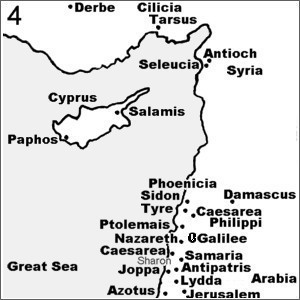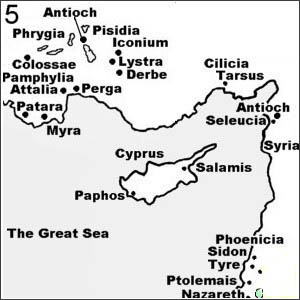
Acts 11:19-30
—Verse by verse
A verse by verse study of the establishment of a new church in Antioch Syria, and the involvement in this work of Paul and Barnabas.
The gospel goes to Antioch in Syria
Acts 11:19-39
¶“19Those who were scattered abroad by the oppression that arose about Stephen, consequently traveled as far as Phoenicia, Cyprus, and Antioch. They spoke the word to Jews only, 20although some of them, men of Cyprus and Cyrene who came to Antioch, spoke to the Greeks, preaching the Lord Jesus.” (Acts 11:19-20).
¶“21The hand of the Lord was with them, and a great number believed and turned to the Lord. 22The church in Jerusalemreport head the report concerning these converts. The church sent out Barnabas to go as far as Antioch. 23When he got there, and saw the grace of God, he was glad. He exhorted them all, that with purpose of heart they should remain near to the Lord. 24Barnabas was a good man, and full of the Holy Spirit and of faith, and many people were added to the Lord.” (Acts 11:21-24).
¶“25Barnabas then left for Tarsus to look for Saul. 26When Barnabas found Saul, he brought him to Antioch. So it was that for a whole year they were gathering together with the church. They taught many people. It was in Antioch that the disciples were first called 'Christians'.” (Acts 11:25-26).
¶“27At that time, prophets came down from Jerusalem to Antioch. 28One of them named Agabus stood up, and indicated by the Spirit that there was going to be a great famine all over the world. This famine happened in the days of Claudius. 29All the disciples who were well off each determined to send relief to the brethren who lived in Judea. 30They sent their gifts to the elders by the hands of Barnabas and Saul.” (Acts 11:27-30).
1 Preaching in Syria
Verses 19-20
¶ "Those who were scattered abroad by the oppression that arose about Stephen, consequently traveled as far as Phoenicia, Cyprus, and Antioch. They spoke the word to Jews only, although some of them, men of Cyprus and Cyrene who came to Antioch, spoke to the Greeks, preaching the Lord Jesus." (Acts 11:19-20).


- Worldwide church planting. Following the killing of Stephen, persecution scattered the Jerusalem congregation (Acts 8:1-4). This did not kill the church. On the contrary, over several years churches were planted, and became established, in Judea, Samaria, and Galilee. The disciples, and their message, also began spreading to other places. Luke here records the spread north along the coastlands into Syria and its neighbouring island Cyprus. In a major advance, a church was established in Syrian Antioch, one of the world’s biggest cities. The preaching was still limited mainly to the Jewish community, but that was all now changing.
- Two Antiochs Note: Acts mentions two cities called Antioch, one in Syria and another in Pisidia.
2 Barnabas and Saul Make “Christians” in Antioch
Verses 21-24
¶ "The hand of the Lord was with them, and a great number believed and turned to the Lord. The report concerning them came to the ears of the church in Jerusalem. They sent out Barnabas to go as far as Antioch. When he got there, and saw the grace of God, he was glad. He exhorted them all, that with purpose of heart they should remain near to the Lord. Barnabas was a good man, and full of the Holy Spirit and of faith, and many people were added to the Lord." (Acts 11:21-24).
- The hand of the Lord. We see, in this passage (Acts 10:21-24), the synergy between the disciples and God. God is working, blessing, and empowering; but the disciples are engaging themselves with God. People were believing and turning to God, making a decision. Preachers were going out converting and encouraging. We observe not only God’s work with them, but the human agency, their purpose of heart in co-operating with God.
- Barnabas We have already met Barnabas. He was the one who helped Saul to be accepted by the church in Jerusalem (Acts 9:22-28). Barnabas was not one of the 12 apostles nor one of the seven deacons. Nevertheless, he was an active, capable, and trusted worker in the church. You don't need title and position to be such.
Verses 25-26
¶ "Barnabas then left for Tarsus to look for Saul. When he found him, he brought him to Antioch. So it was that for a whole year they were gathering together with the church. They taught many people. It was in Antioch that the disciples were first called “Christians”." (Acts 11:25-26).
- Barnabas finds Saul. Saul had gone to his home town Tarsus, not too far from Antioch. Paul and Barnabas became devoted companions in evangelism, beginning with a year working together in the Antioch church.
- First called “Christians” Up to this point, converts to Christ were referred to in terms such as as believers, saints, and disciples. The name “Christians” originated in the city of Antioch. It was a name, not a nickname, and Peter says that we "glorify God in that name" (1Peter 4:16).
3 Prophets Come from Jerusalem: Agabus Predicts Famine
Verse 27-30
¶ "At that time, prophets came down from Jerusalem to Antioch. One of them named Agabus stood up, and indicated by the Spirit that there should be a great famine all over the world. This famine happened in the days of Claudius. All the disciples who were well off each determined to send relief to the brothers who lived in Judea. They sent their gifts to the elders by the hands of Barnabas and Saul." (Acts 11:27-30).
- Prophets came down. In the beginning of the church there were not only apostles, but also prophets. These were preachers who were moved to speak by the Holy Spirit, rather than preaching only what someone else had taught them. One of the abilities of a prophet of God is prediction. Agabas predicted a famine which later came to pass during the reign of the Roman Emperor Claudius circa AD41-54. If a prophet predicts something, and it doesn't happen, he or she is a false prophet (Deuteronomy 18:21-22).
- Sending of gifts. Knowing that a famine would hit Jerusalem hard, the Christians in Antioch made a plan to send aid. This gift was delivered by Barnabas and Saul. It reflected the fellowship which the disciples in Jerusalem themselves practised (Acts 2:44-45). Antioch took this fellowship to a new level —one church helping another church. This was an ongoing work. Other churches participated, and Paul picked up and delivered some of their gifts in his missionary journeys (eg 1Corinthians 16:1-4).
- To the elders. This is Luke’s first mention of elders in the church. So far in our study of Acts we have seen apostles, prophets, deacons, and evangelists at work in the church. Elders also had an important place in a congregation’s polity. Peter exhorts the elders in the churches to "shepherd the flock of God among you" (1Pe5:1-4). Paul did the same: "Shepherd the church of God which he purchased with his own blood" (Acts 20:28).
- The church needs trustworthy people. Agabus was trustworthy: his prophecy came true. The Christians at Antioch were trustworthy: they made good their promise to give aid. Barnabas and Saul were trustworthy: they delivered the money. The elders in Jerusalem were trustworthy: they administered and distributed the funds. The church members in Jerusalem were trustworthy: they didn't misrepresent their need or take more than their due. Without trustworthiness, the church cannot function.